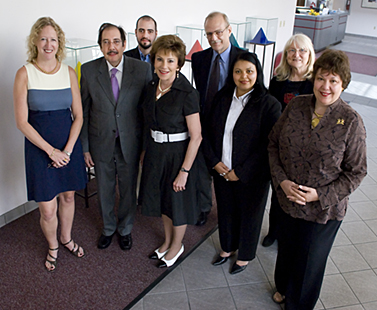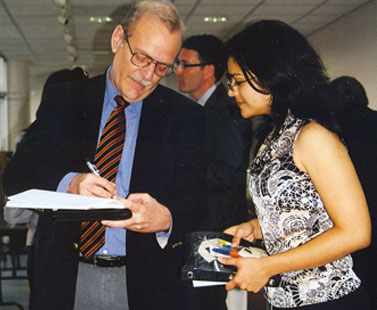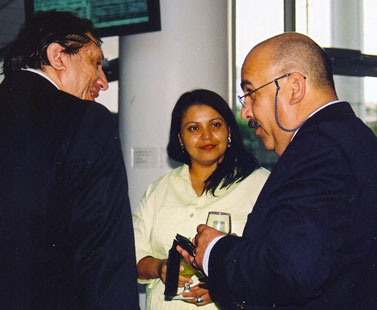Experts tackle global sustainability and health issues
Aim is to advance collaborative research and education in Panama
A two-day event focusing on global sustainability and health was hosted earlier this month by the USF College of Public Health and the USF Health International Foundation, in collaboration with Centro Internacional para el Desarrollo Sostenible (CIDES), a major international organization at the Ciudad del Saber (City of Knowledge) in Panama City, Panama.
“Experts from Panama and USF gathered to tackle the thorny issues of protecting and preserving the environment, culture, and health of citizens, while facilitating responsible and sustainable development – issues that are just as relevant to Florida as they are to Panama,” said Donna Petersen, ScD, dean of the College of Public Health.

L to R: College of Public Health Dean Dr. Donna Petersen, Dr. Rodrigo Tarté, Andres Tarté, USF President Judy Genshaft, Dr. Guillermo Castro, Eda Soto, USF Health AVP for International Programs Dr. Ann DeBaldo, and Dr. Arletty Pinel.
The guests from Panama included Dr. Rodrigo Tarté, Executive Director, CIDES, and his son Andres Tarté; Dr. Guillermo Castro, Academic Director, City of Knowledge; Dr. Arletty Pinel, Director, SurGlobal at City of Knowledge; and Eda Soto, Environmental Protection Specialist, Panama Canal Authority.
On May 3, the guests gave a series of presentations on the impact of the Panama Canal’s expansion on the ecosystem, including its implications for local and global health and opportunities for public health and related environmental research initiatives. In addition to being the principal source of water required for ship transits through the Canal, the Panama Canal watershed provides 95 percent of the drinking water for inhabitants of the region. The ongoing expansion, one of the world’s largest water management projects, is adding locks and deepening the Canal’s navigation channel to double its capacity.

USF President Judy Genshaft displays the gift presented to USF by the Panama guests. It was hand-woven with recycled paper and natural fibers by indigenous women in the community of Jaqué in Darién, Panama.
On May 4, the Panama guests met with USF President Judy Genshaft, officials from the USF School of Global Sustainability, the USF Health International Foundation Council and Stephen Klasko, MD, MBA, CEO for USF Health and dean of the College of Medicine.
“Their visit has advanced our efforts to build collaborative programs in research and education. We are planning to form a consortium of interested parties, which is needed to apply for larger grants to fund these programs,” said Ann DeBaldo, PhD, associate vice president for International Programs at USF Health. “What better place to study than in a living laboratory, an important and sensitive ecosystem like the Panama Canal watershed?”

City of Knowledge Academic Director Dr. Guillermo Castro with public health doctoral student Ligia Cruz.
The USF Health International Foundation officially opened its doors in the country of Panama in June 2008, and USF Health’s Panama office is located at the City of Knowledge. Their mission is to increase collaboration in education, research and health and training for patient care between USF faculty and students and Panama, as well as other health professionals and organizations throughout the region.

L to R: Dr. Ricardo Izurieta, Department of Global Health, COPH; Eda Soto, Environmental Protection Specialist, Panama Canal Authority; and Dr. Willie Moreno, Department of Electrical Engineering, College of Engineering.
Story by Anne DeLotto Baier, USF Health Communications
Photos by Eric Younghans, USF Health Communications, and Ellen Kent, College of Public Health

